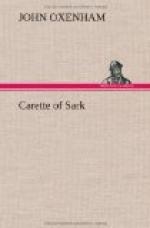Not a sail did I see that whole day, but being so low in the water my range was of course very limited. In the times when I could get away for a moment or two from my hunger and thirst, my thoughts ran horribly on the previous day’s happenings—those hurtling iron flails against which we were powerless—that little round hole that bored itself in John Ozanne’s forehead—that cold-blooded shooting of drowning men—the monstrous brutality of it all! What little blood was in me, and cold as that was, surged up into my head at the recollection, and set me swaying on my perch.
And then my thoughts wandered off to the poor souls in Peter Port, hopefully speculating on the luck we were like to have, counting on the return of those whose broken bodies were dredging the bottom below me,—to the shocking completeness of our disasters. Truly when it all came back on me like that I felt inclined at times to loose my hold and have done with life. And then the thought of Carette, and my mother, and my grandfather, and Krok, would brace me to further precarious clinging with a warming of the heart, but chiefly the thought of Carette, and the good-bye she had waved to me from the point of Brecqhou.
I might, perhaps, with reason have remembered that what had happened to us was but one of the natural results of warfare—barring, of course, the murderous treatment of which no British seaman ever would be guilty. But I did not. My thoughts ran wholly on the actual facts, and, as I have said, faintly at times, but to my salvation, on Carette and home.
While the sun shone, and the masses of soft white cloud floated slowly against the blue, hope still held me, if precariously at times. At midday, indeed, the fierce bite of his rays on my bare back—for we had stripped for the fight and I had on only my breeches and belt—combined with the salting of the previous night and the dazzle of the dancing waves added greatly to my discomfort. I felt like an insect under a burning glass, and suffered much until I had the sense to slice a piece off my sail with my knife and pull it over my raw shoulder bones. But when night fell again, the chill waste of waters washed in on my soul and left me desolate and hopeless, and I hardly hoped to see the dawn.
I remember little of the night, except that it was full of long-drawn agony and seemed as if it would never end. But for the rope under my arms and the loop of the sail, into which some time during the night I slipped, I must have gone, and been lost.
In the morning the sun again woke what life was left in me. I had been nearly forty-eight hours without food or drink, and strained on the edge of death every moment of that time. It was but the remnant of a man that lay like a rag across the spar, and he looked only for death, and yet by instinct clung to life.
And when my weary eyes lifted themselves to look dully round, there, like a white cloud of hope, came life pressing gloriously towards me—a pyramid of snowy canvas, dazzling in the sunshine, the upper courses of a very large ship.




